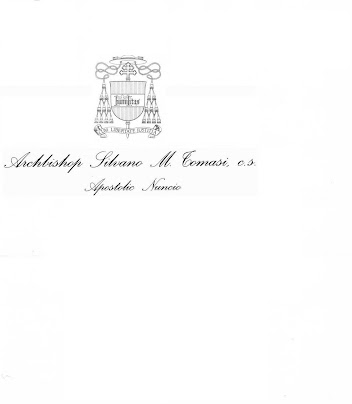Intervention by H.E. Archbishop Silvano M. Tomasi, Permanent Representative of the
Holy See to the United Nations and Other International Organizations in Geneva
at the Interactive Dialogue on Human Rights and Foreign Debt, Item 3
14th Session of the Human Rights Council
Geneva, 2 June 2010
Mr. President,
Let me start by thanking the independent expert for his report presented to the Council. The reports draws attention to the negative impacts of “vulture fund” activities on international debt relief efforts and on the capacity of indebted poor countries that have benefitted from debt relief to create the necessary conditions for the realization of human rights. It also examines the measures and proposals designed to combat these speculative investors.
The sharp contraction of the global economy that began in the second half of 2008 and accelerated into the first quarter of 2009 doesn’t appear to be slowing down. The economic situation is still fragile and prospects are still uncertain in all regions of the world. The financial crisis was harsher in the developed countries and consequently its effects have been felt most severely there, but the subsequent collapse of aggregate demand in those countries is still working its way through the global economy and in particular on the Least Developed Countries. The international community cannot ignore this fact; while reaffirming the principle that debts must be repaid, ways must be found that do not compromise the “fundamental right of peoples to subsistence and progress” .The economy is not above the priority of human rights since it is at the service of the human person and the common good.
The voluntary nature of international debt relief schemes has created opportunities for vulture funds to acquire defaulted sovereign debt at vastly reduced prices and then seek repayment of the full-face value of the debt through litigation, seizure of assets or political pressure. The goal of such activities is to obtain high returns at bargain prices regardless of the ethical consequences of such actions. The so-called vulture fund activities complicate sovereign debt restructuring by causing inequitable burden sharing among creditors, and undermine trade and investment relations of the countries that they target.
The debt of the developing countries must be placed in a broader context of economic, political, human rights and technological relations concerns as well as of international collaboration in pursuing the objectives of the common good. This interdependence calls for a new and more comprehensive concept of solidarity which respect the equal dignity of all peoples. Solidarity implies an awareness and acceptance of co-responsibility for the causes and the solutions relative to international debt. Co-responsibility will help to create or restore relations based on trust between nations (creditors and debtors) and between the various actors (political authorities, commercial banks, international organizations) for cooperation in the search of solutions. Thus mutual trust is an indispensable value which must be constantly renewed.
While we support the solution proposed in the report, our delegation would like to ask the independent expert what form of State control and preventive measures in the financial market could impede the emergence of manipulative strategies that damage the Heavily Indebted Poor Countries(HIPCs).
Stemma Episcopale

Questo e lo Stemma Episcopale del ArciVescovo Mons. Silvano Maria Tomasi, missionario Scalabriniano. Lo stemma ricorda il patrono della congeregazione Scalabriniana voluto dal Beato G.B. Scalabrini, San Carlo Borremeo nel suo stemma ce questa scritta Humilitas.
mercoledì 2 giugno 2010
Iscriviti a:
Commenti sul post (Atom)

Nessun commento:
Posta un commento